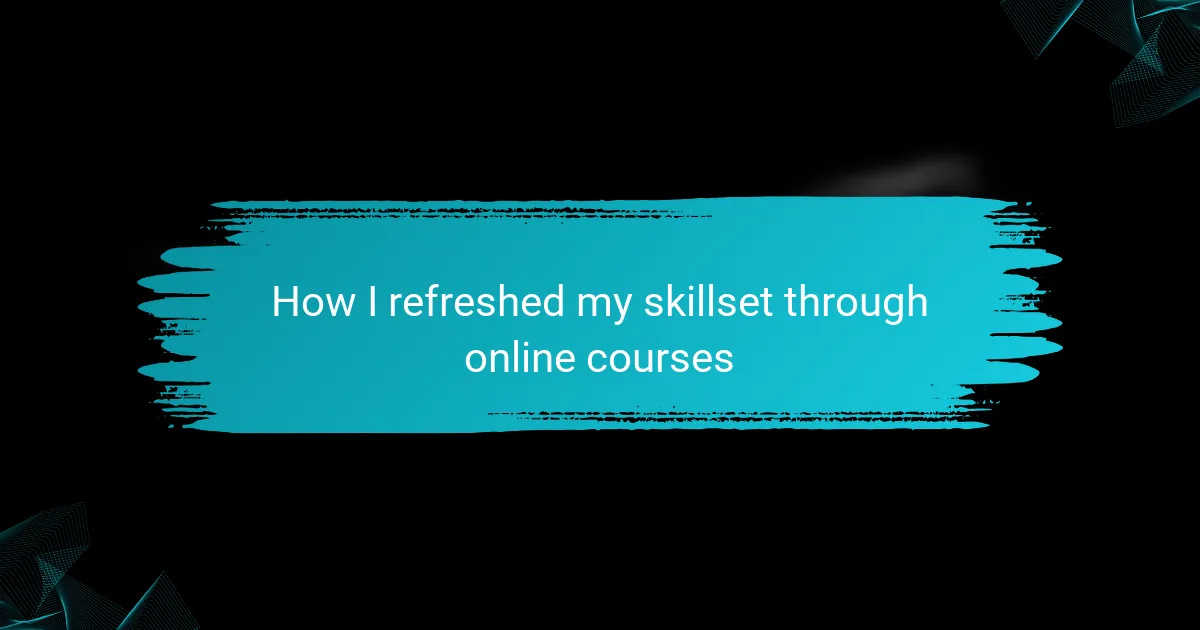Key takeaways
- Wedding photography blends technical skills and emotional storytelling, requiring both creative composition and effective client communication.
- Continuous learning, particularly through online courses, is crucial for keeping up with evolving techniques and enhancing creative perspectives.
- Online courses offer flexibility and access to expert instructors, fostering community support and practical application of new skills.
- Choosing the right course aligned with your goals and skill level is essential for a meaningful learning experience.
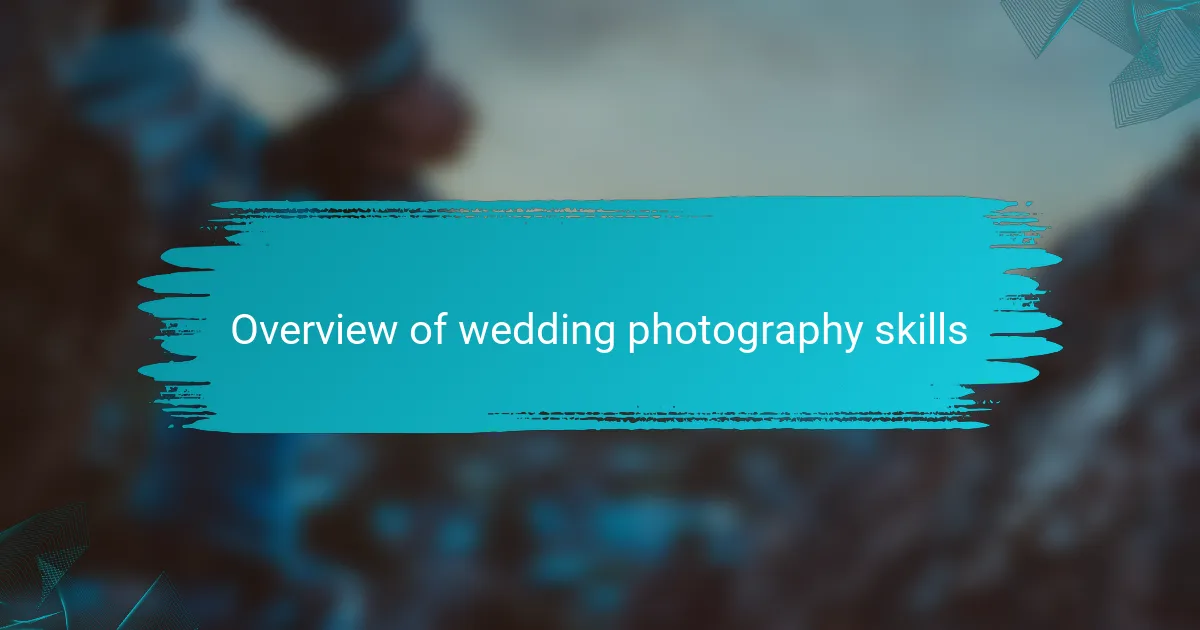
Overview of wedding photography skills
Wedding photography is a unique blend of technical expertise and emotional storytelling. It requires a solid understanding of composition, lighting techniques, and the ability to capture intimate moments as they happen. I remember the first wedding I photographed; the pressure was immense, but the joy of freezing precious moments made every bit of effort worthwhile.
Moreover, successful wedding photography also involves communicating effectively with clients and being adaptable to different environments. I’ve found that the ability to engage with couples and understand their visions is just as important as the technical skills behind the camera.
Here’s a comparison of essential wedding photography skills:
| Skill | Description |
|---|---|
| Technical Skills | Understanding camera settings, lenses, and lighting conditions. |
| Creative Composition | Using framing, angles, and backgrounds to enhance images. |
| Interpersonal Skills | Building rapport with clients to capture their unique stories. |
| Post-Processing | Editing photos to enhance quality and style. |
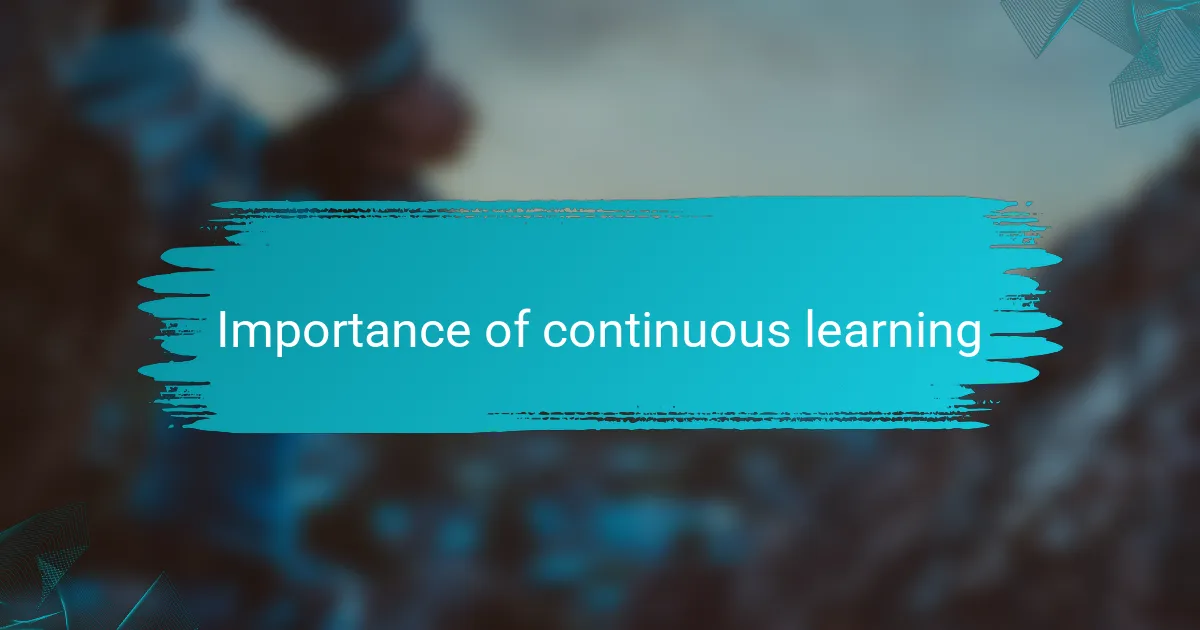
Importance of continuous learning
Continuous learning is essential in any profession, but especially in wedding photography, where the landscape is always changing. I often reflect on how quickly new techniques and tools emerge. Each course I take not only deepens my understanding but also inspires me creatively. Have you ever felt stuck in your work? I certainly have, and that’s when I realized how pivotal ongoing education can be.
When I first ventured into this field, I relied heavily on a few tried-and-true methods. Over time, I discovered that learning new skills, like advanced editing techniques or mastering a new camera, opened doors to stunning possibilities. I remember a specific online course on drone photography, which not only added a new dimension to my portfolio but also reignited my passion for capturing weddings. It’s incredible how learning can transform your perspective and enrich your artistry.
Moreover, continuous education fosters adaptability. In today’s fast-paced world, the ability to respond to trends can set a photographer apart. I’ve engaged in workshops focused on social media marketing, which revolutionized how I connect with couples. This adaptability keeps me relevant and ensures my work resonates with clients in a meaningful way. Wouldn’t you agree that staying connected with emerging trends is vital for success in this ever-evolving field?
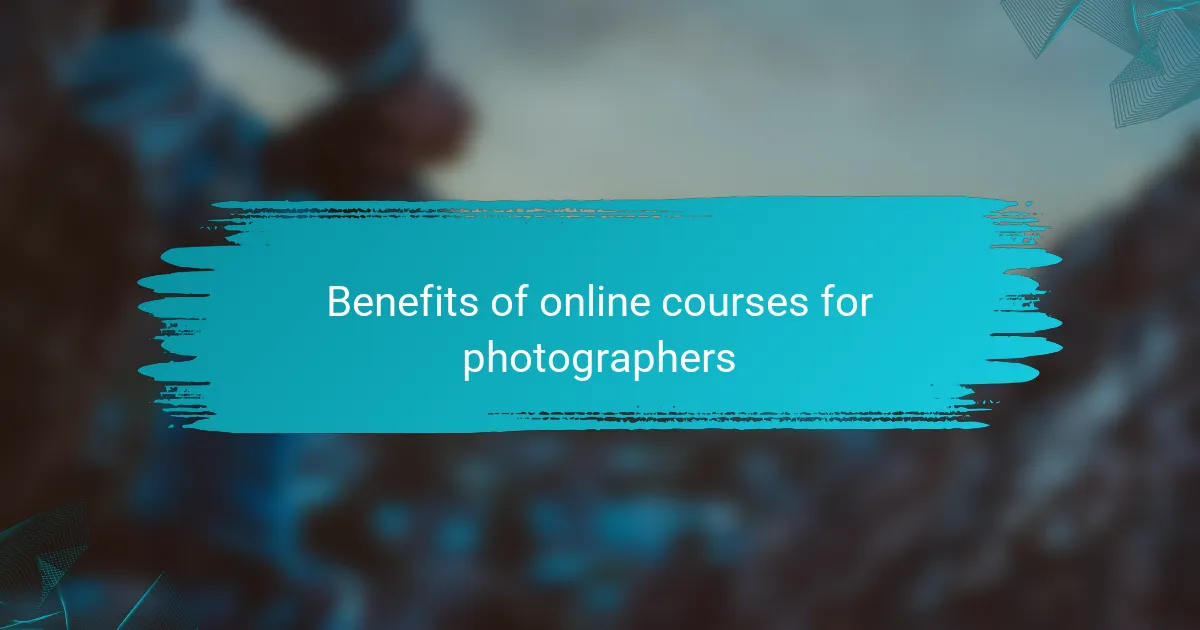
Benefits of online courses for photographers
Online courses have transformed my approach to photography in so many ways. Not only do they offer flexibility, allowing me to learn at my own pace, but they also provide access to expert instructors and innovative techniques that I might not have encountered in traditional settings. For instance, taking a course on lighting changed how I approach shoots, dramatically enhancing the quality of my work and boosting my confidence behind the camera.
Another advantage is the sense of community that comes from online learning. I’ve connected with fellow photographers worldwide, sharing experiences and tips that have enriched my practice. It’s great to feel part of a larger family, even if it’s virtual, where everyone shares a passion for capturing beautiful moments, especially in wedding photography.
Here’s a quick comparison of online courses versus traditional workshops for photographers:
| Aspect | Online Courses | Traditional Workshops |
|---|---|---|
| Flexibility | High; learn at your own pace | Limited; fixed schedules |
| Cost | Generally lower | Often higher due to venue costs |
| Access to Experts | Global access to top professionals | Local experts may be limited |
| Networking | Online communities | In-person interactions |
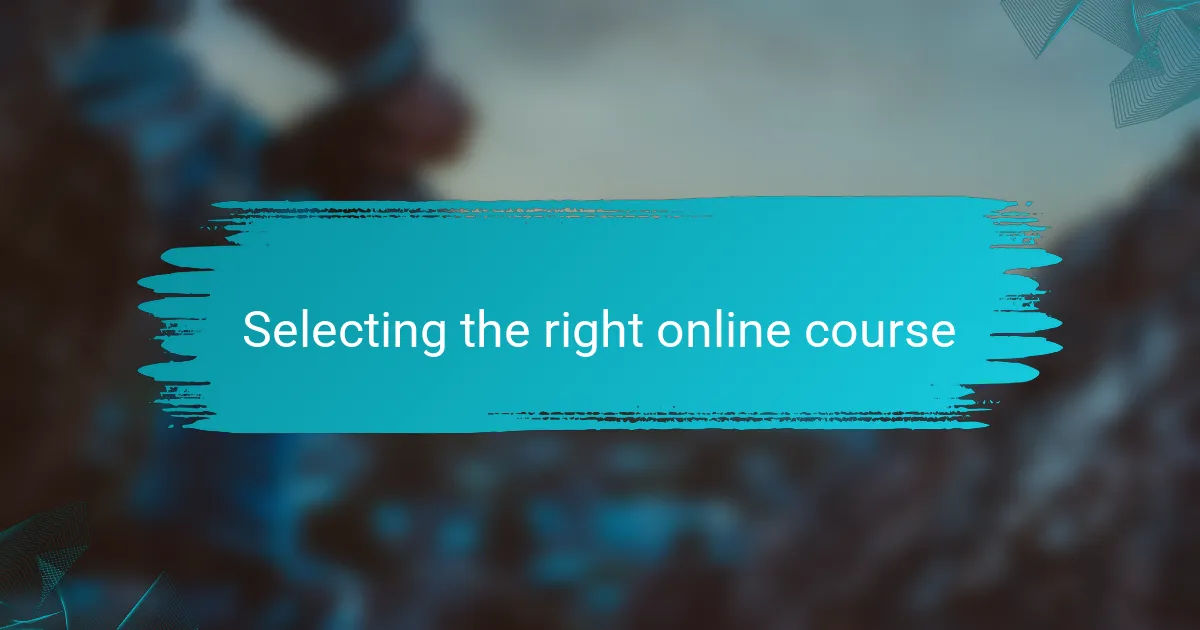
Selecting the right online course
Selecting the right online course can truly make or break your learning experience. I’ve navigated through a sea of options, and I’ve found that aligning a course with my specific photography goals is essential. For instance, while exploring online classes, I once stumbled upon a workshop focusing exclusively on lighting techniques, and it transformed how I approach shoots.
When evaluating courses, I often compare the content with my current skill level. I recall enrolling in a course that promised a lot but didn’t cater to my intermediate knowledge, which left me feeling lost. That experience taught me to always check course prerequisites and read reviews to ensure the material resonates with where I am in my journey.
Here’s a comparison table that illustrates some key aspects to consider when selecting an online photography course:
| Course Feature | Importance |
|---|---|
| Skill Level | Ensure it matches your current knowledge (beginner, intermediate, advanced) |
| Content Focus | Select courses that align with your interests (e.g., portrait, landscape photography) |
| Instructor Experience | Look for instructors with proven expertise and positive reviews |
| Course Format | Decide between video content, live sessions, or written material based on your learning style |
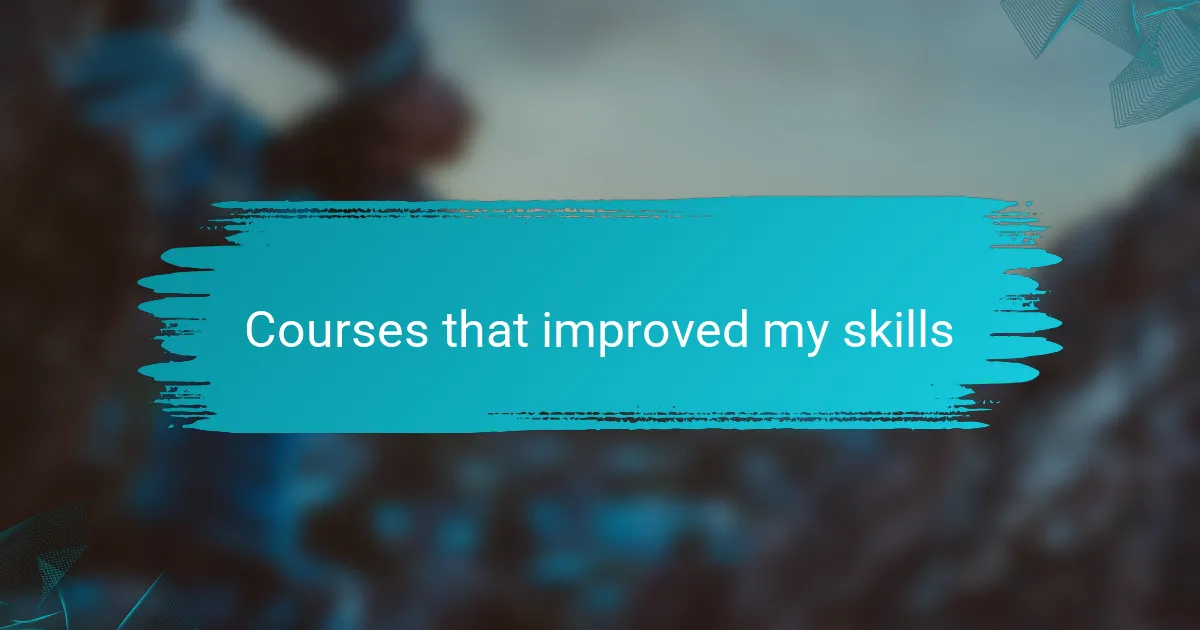
Courses that improved my skills
Taking online courses has significantly enhanced my skills as a wedding photographer. For example, I enrolled in a course that focused solely on composition techniques, and it opened my eyes to new creative perspectives. I remember looking back at my old photos after completing it, realizing how much I had evolved. It’s incredible how a shift in understanding can change the way you see every scene through your lens.
I also found a course dedicated to drone photography, which was thrilling; capturing weddings from above added a whole new layer to my offerings. The first time I showcased aerial shots, the couple’s reaction was priceless. It reinforced the idea that investing time in learning can transform not just my skill set, but also the overall experience for my clients. Have you ever felt that surge of excitement when mastering a new technique? It’s truly invigorating.
Another standout was a post-processing course that taught me advanced editing techniques. Suddenly, I was able to elevate my images from mundane to spectacular. I recall feeling a sense of pride when I compared edits from before and after the course. Learning such skills gave me confidence in my artistic vision, changing how I approach my work. If you haven’t explored the vast array of online courses available, I highly recommend diving in. The right course might just be the inspiration you need.
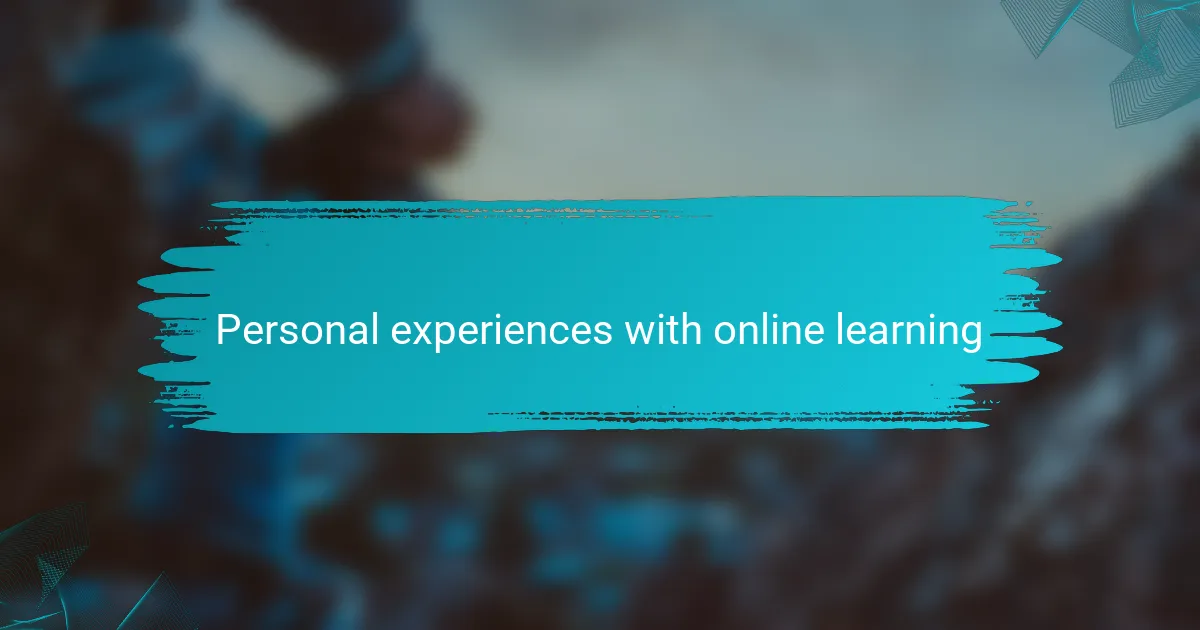
Personal experiences with online learning
Diving into online learning opened doors for me that I never expected. One course, focused specifically on lighting techniques, drastically changed my approach to wedding photography. I remember the moment I applied what I learned in real-time at a friend’s wedding; the way the natural light illuminated their first dance was breathtaking, and it was all thanks to those lessons.
Through my experiences with online courses, I discovered several key benefits:
- Flexibility: I could learn at my own pace, fitting courses in between shoots and editing sessions.
- Variety of Topics: From composition to post-processing, I explored everything that piqued my interest.
- Community Support: Engaging with fellow photographers through discussion forums enhanced my understanding and provided valuable feedback.
- Accessible Resources: I often revisited recorded lectures and notes, which reinforced my learning over time.
- Practical Application: Implementing new techniques immediately during shoots helped solidify the skills I gained.
These experiences not only enhanced my technical abilities but also reignited my passion for capturing special moments.
